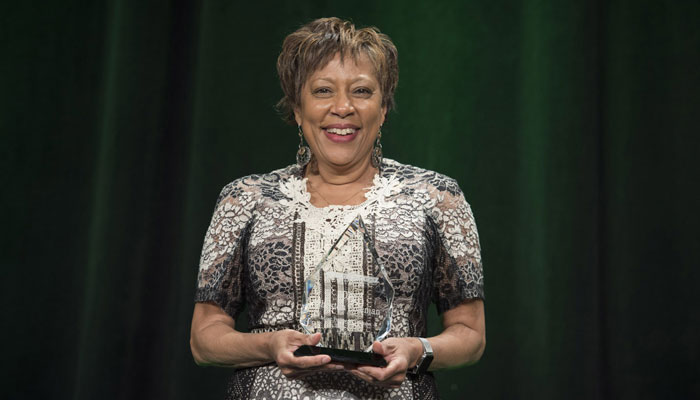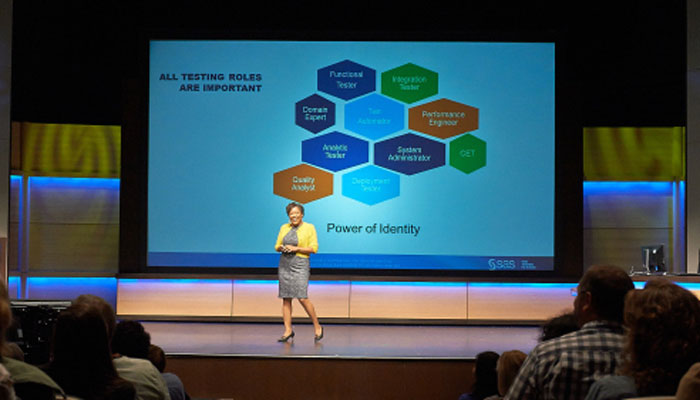
In the early 1980s – years before most people had received their first email or seen their first website, more than 20 years before UNCG’s Department of Computer Science was created, and long before the launch of UNCG’s Ph.D in Computer Science – Spartans were at the cutting edge of learning in software development and programming.
Their foundational work in computing remains an important building block in technology that has been created – as well as what is yet to come.
One of those Spartans is Oita Coleman ’82.
Coleman, a College of Arts and Sciences Advancement Council member, grew up in Norlina, a small North Carolina town in Warren County, near the Virginia line. She graduated from high school as salutatorian of her class and was voted “Most Likely to Succeed.” Despite that, a guidance counselor told her she wasn’t college material. Fortunately, her parents – like everyone who really knew her – strongly disagreed, including her grandmother.
“My grandmother was a teacher who ran a one-room schoolhouse. So, I was to be a third-generation college student, which was really unique among African Americans at that time,” Coleman says. “That’s why I advocate for and work with students who are first-generation. I look back and think what a privilege it was for me to have parents who were college graduates and my grandmother.”
While her family didn’t know she’d grow up to be the highest ranking African American at SAS, a multinational software development company, they knew she was going places.
Coleman’s mother arranged a meeting for her daughter with the admissions office at UNCG. A NC A&T graduate, Coleman’s mother was familiar with UNCG because of some joint programming among the two schools.
“She just felt UNCG was where I should be,” Coleman says.
As a new college student, Coleman pursued a degree in mathematics and a concentration in computer science – at the time an atypical choice for women and for people of color. Computer science was a very new field in academia and was most often housed in mathematics departments.
But, it added up.
Solid Spartan steps
Coleman, named one the “50 Most Powerful Women in Tech” by the National Diversity Council in 2019, valued the solid education she received at UNCG in analytics and in logic, with clear applications in computing. Her four-decade career, including work in artificial intelligence, she can trace back to the comprehension she developed at UNCG as a student.

“There was a benefit to me later in my career in being part of the mathematics department, with the focus on the principals of analytics and logic,” Coleman says. “That’s so important in understanding and really getting into programming, and what I’m doing now with the work in artificial intelligence related to voice technology.”
At UNCG, she also discovered a mentor in Debra Turner (Bailey), who was the dean of Minority Affairs, as well as advisor of the Neo-Black Society. Coleman volunteered as an intern in the Minority Affairs office and her involvement there helped her find her place at UNCG.
“I just can’t give her enough credit for just being a role model, and helping us through the college experience,” Coleman says about Turner.
While she was still a student, the Career Counseling Center (now the Career and Professional Development Office) helped her find an internship at Ciba-Geigy, where she became a programmer analyst, as well an internship at the Office of the Governor. Those internships set her up for her first job out of college, at Data General, now part of Dell.
After that, she moved to SAS, which was then up-and-coming but was still known, as it is today, as one of the most desirable software companies to work for. And Coleman was well-equipped for the job because the SAS programming language had been part of her statistics and programming curriculum at UNCG.

“It was a language that I always enjoyed, how powerful it was. I enjoyed using the software. I started out at the company as a quality analyst, a software tester. And my goal was to move back into software development. But I realized that I was much happier as a tester focused on breaking the software, and my skills were suited to trying to analyze it, finding the bugs. And it just led to my interest in general delivering quality and making sure that the software that the users had were of the best quality and defect-free, that the numbers were correct, that it performed successfully, that it was secure, that it had the features that users expected.”
When Coleman retired from SAS, after 33 years, she was leading the quality effort globally, working with colleagues from all over the world.
Voice ethics
Now, in her work with Open Voice Network (OVON), a tech nonprofit that’s affiliated with the Linux Foundation, Coleman is helping to develop a set of principles and standards for voice assistance technology that ensures the technology respects privacy and security of users.
Coleman says that currently there is no U.S. federal legislation concerning artificial intelligence technology or, in particular, voice assistance technology and data protection. And there is no consistency across tech companies, operating on all different platforms, and finding its way into cars, retail spaces, and in a variety of other places. As a senior advisor at the Open Voice Network (OVON), she is working to develop guidelines similar to those in the European Union that protect individuals and enterprises.
And it’s not just the words that are spoken that matter.
“There’s even so much you can find out from the human voice,” Coleman says. “Our voice is one of the most unique, distinctive things about us. Voice data can verify your identity, reveal things related to mental and physical health, tell ethnicity, race, gender, personality type, and the geographical area where you live. So, once all that information is gathered, you can really come up with a very unique profile of the person. Through wellness devices, voice recordings have even been used to detect whether or not someone has COVID-19. So, the work that we’re doing is trying to make sure that the technology respects the rights and promotes the values to make the technology worthy of user trust.”
With her OVON colleagues, Coleman has been meeting with representatives in the European Union. They’ll determine what information they can bring to lobbyists, who will in turn approach members of Congress to see what legislation should be created regarding AI and data privacy, especially concerning the rights of minors.
She’s also working on inclusivity, so that voice assistance technology doesn’t privilege certain dialects, genders, ages, or vocal patterns related to physical ability, and that it doesn’t create stigmas for the type of voices used by the devices.
“And again,” Coleman says, “this is just something that allows me to bring together all of my experiences and passion to focus again on the quality experience, but from a different perspective.”
Find your own voice
Coleman’s journey through software quality from PCs to mobile devices to even gaming has been a pleasure to her and reminds her of something she appreciates from her time at UNCG.
“In a liberal arts and sciences program, you have the benefit of the joy of learning and exploration,” Coleman says. “There’s the quest for knowledge, the curiosity, the love of learning and exploring, and I see that as I look back now. Not being afraid to learn something new, to tackle something new. And just being able to pivot when you need to.”
To Spartans looking to get into tech, Coleman says:
“Don’t be afraid of it. There are so many areas where you can engage. When I was in school, you were either a developer or a programmer. But now, there’s so many career avenues. And even now, as I talk about the voice technology, and the conversations we’re having, the work doesn’t necessarily require someone with a computer science degree. You can approach this from a legal standpoint, from a social science standpoint, from an ethical standpoint, because the field of artificial intelligence and analytics is broad. There are so many ways other than being one person who works alone, coding. It’s a very different field now, and you can find your place. Don’t be afraid to explore different things and pivot, and just see.”

And, as we consider Women’s History Month, she offers the following:
“For women, don’t be afraid to take your seat at the table… You can’t lean in, if you’re not in the room. Don’t be afraid to use your voice. I think I found my voice at UNCG. And I’m happy for that to come around full circle to what I’m doing now, to be able to use my voice to advocate for those who are underrepresented in STEM and technology. Students are new talent in those fields, and it’s important that we continue to get them into STEM because there’s really the economic engine that runs the U.S. economy. And we have to ensure that it’s not just the sheer number of students we’re growing, but a diverse population.”
Oita Coleman currently serves on the College of Arts and Sciences Advancement Council.
Story and interview by Susan Kirby-Smith, University Communications
Photography and images courtesy of Oita Coleman


